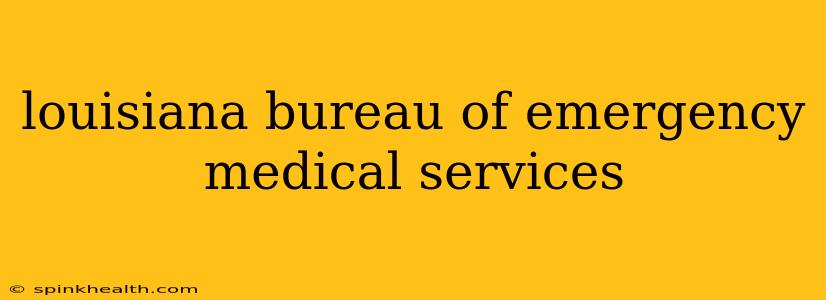Louisiana's vast landscape, from bustling cityscapes to sprawling rural areas, demands a robust and responsive emergency medical services (EMS) system. Understanding how this system operates, its intricacies, and the resources available is crucial for both residents and visitors. This guide delves into the Louisiana Bureau of Emergency Medical Services (OBEMS) and its vital role in ensuring timely and effective emergency care across the state.
Imagine this: A late-night accident on a rain-slicked highway, a sudden cardiac arrest in a quiet neighborhood, a natural disaster unfolding in a remote parish. In each scenario, the swift and skilled response of Louisiana's EMS system is the lifeline between life and death. But who coordinates this intricate network of ambulances, paramedics, and emergency medical technicians (EMTs)? That's where the Office of Public Health's Bureau of Emergency Medical Services comes in.
What is the Louisiana Bureau of Emergency Medical Services (OBEMS)?
The OBEMS isn't a direct provider of emergency services itself; instead, it acts as the regulatory and oversight body for the entire EMS system in Louisiana. Think of it as the conductor of an orchestra, ensuring each section—from dispatch centers to individual ambulance services—plays its part harmoniously and effectively. Their primary role is to establish and maintain high standards of care, ensuring Louisianans receive the best possible emergency medical treatment, regardless of location.
What are the Responsibilities of OBEMS?
The OBEMS shoulders a significant responsibility, encompassing a wide array of crucial functions. These include:
-
Establishing and enforcing standards: OBEMS sets the minimum qualifications for EMTs and paramedics, ensuring they possess the necessary skills and knowledge to handle emergencies effectively. They also regulate ambulance services, ensuring adherence to safety and operational standards.
-
Licensing and certification: The bureau is responsible for licensing EMS providers and certifying EMTs and paramedics, guaranteeing they meet Louisiana's rigorous standards of competence.
-
Developing and implementing protocols: OBEMS creates and updates protocols that guide pre-hospital care, ensuring consistent and evidence-based treatments are delivered across the state.
-
Data collection and analysis: Through rigorous data collection and analysis, OBEMS tracks emergency response times, identifies areas needing improvement, and helps guide resource allocation to optimize the system's efficiency.
-
Emergency preparedness: OBEMS plays a critical role in preparing for and responding to large-scale emergencies and disasters, coordinating resources and ensuring the system can effectively handle surges in demand.
How Does OBEMS Work with Local EMS Agencies?
OBEMS doesn't operate independently; it works collaboratively with numerous local EMS agencies across the state. These agencies are the ones that actually dispatch ambulances and provide on-site emergency care. OBEMS acts as the overarching regulatory body, ensuring these agencies adhere to state standards and providing guidance and support.
How Can I Find My Local EMS Agency?
Locating your local EMS agency is typically straightforward. A quick online search for "[your parish] EMS" or contacting your local fire department or police department will generally provide the necessary contact information.
What Training is Required to Become an EMT or Paramedic in Louisiana?
The OBEMS website provides detailed information on the educational requirements and certification processes for EMTs and paramedics. Aspiring EMS professionals must complete accredited training programs and pass rigorous examinations to earn their certifications.
What is the role of OBEMS in Disaster Preparedness?
OBEMS plays a pivotal role in disaster preparedness and response, working with other state agencies and local authorities to develop and implement emergency plans. Their expertise is essential in ensuring the effective coordination of resources during hurricanes, floods, and other large-scale emergencies.
In conclusion, the Louisiana Bureau of Emergency Medical Services is a vital component of the state's healthcare infrastructure. Its tireless work ensures a high standard of pre-hospital care, ultimately saving lives and improving the health and well-being of all Louisianans. Understanding its role and responsibilities enhances public awareness and fosters better preparedness during emergencies.

